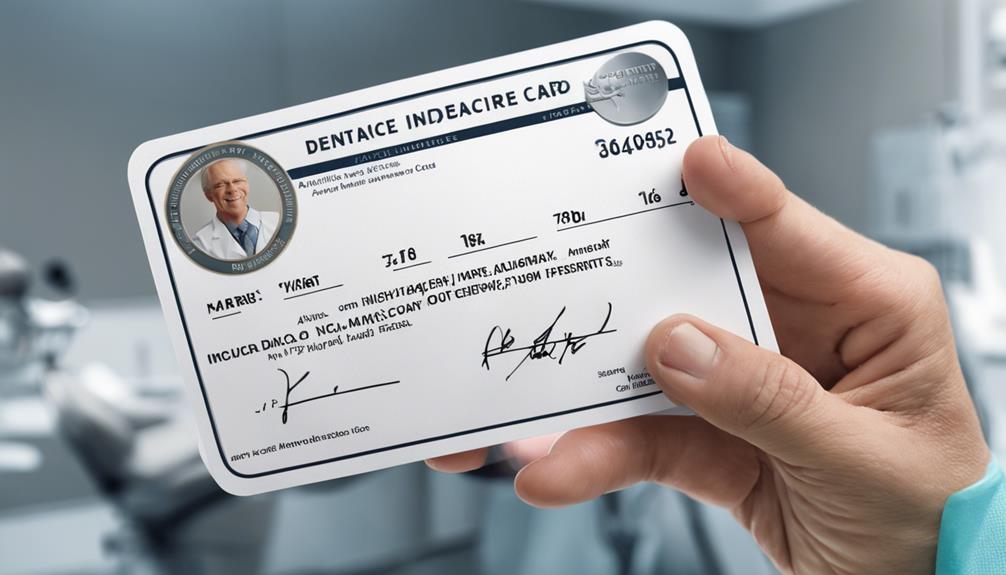Navigating the complex world of health insurance coverage, understanding how Medicare handles dental care can often feel like navigating through a confusing maze filled with unexpected surprises and challenges.
Many individuals find themselves pondering the question: Does Medicare truly cover dental services?
The answer may not be as straightforward as we hope, but fear not, as we unravel the complexities of this topic, shedding light on the nuances that dictate dental coverage under Medicare.
Key Takeaways
- Medicare Advantage plans offer routine dental services.
- Original Medicare has limited dental coverage.
- Supplemental dental insurance enhances Medicare's coverage.
- Regular check-ups crucial for early dental problem detection.
Types of Medicare Dental Coverage
When considering Medicare dental coverage options, it's important to understand the various types available under Medicare Advantage plans and stand-alone dental policies. Medicare Advantage Plans cover routine dental services such as exams and cleanings, providing essential preventive care for maintaining good oral health. These plans can also offer coverage for more extensive dental work like fillings or extractions, although members typically pay a larger portion for services such as crowns or dentures.
On the other hand, stand-alone dental policies can be purchased to complement Original Medicare (Part A and Part B) coverage, filling the gap for comprehensive dental work that may not be covered by Medicare Advantage plans. These standalone dental plans can be tailored to individual needs, offering low-cost dental options for those seeking specific treatments or a comprehensive workup of their oral health. Understanding the types of dental coverage available can help individuals make informed decisions about their oral health needs within the Medicare system.
Dental Coverage With Medicare Advantage

Most Medicare Advantage plans offer some form of dental coverage, with only a minority of enrollees paying an additional premium for these benefits. In 2021, nearly all Medicare Advantage plans included basic dental services like cleanings and X-rays in their coverage. However, coverage for more extensive services such as crowns, dentures, and caps can vary among plans.
While basic services are often covered with a small copayment or no cost-sharing at all, members usually bear a larger portion of the cost for these more advanced procedures. The average coverage cap for dental services under Medicare Advantage plans was around $1,300 in 2021, providing an annual limit on benefits.
It's essential for enrollees to review their specific plan details to understand what dental services are covered, the associated costs, and any limitations or caps that may apply to ensure they make the most of their dental coverage.
Dental Coverage With Original Medicare
Original Medicare provides limited coverage for dental services, primarily focusing on those that are integral to other covered medical procedures. Routine dental care such as check-ups, cleanings, fillings, and dentures are generally not covered under Medicare. However, Medicare does cover dental services that are deemed medically necessary for specific situations, like dental work required before organ transplants or for individuals undergoing certain medical treatments like cardiac procedures or cancer therapies. Coverage extends to dental care in rural clinics before surgeries or treatments related to jaw diseases.
It's crucial to note that Medicare doesn't typically cover routine dental services or follow-up care, including dentist fees or dental-related hospitalizations. While Original Medicare's dental coverage is limited, individuals have the option to explore supplemental insurance like Medicare Advantage Plans or standalone dental insurance plans to help cover additional dental expenses not included in Original Medicare. These supplemental options can provide beneficiaries with more comprehensive dental coverage beyond what Original Medicare offers.
Dental Coverage With Supplement Insurance

Supplemental dental insurance plays a crucial role in enhancing Medicare's limited dental coverage by filling the gaps and reducing out-of-pocket expenses for necessary dental care. These plans help bridge the coverage gaps left by Medicare, offering a range of services such as cleanings, fillings, crowns, and more. Premiums for supplemental dental insurance vary depending on the level of coverage desired, making it a flexible option for individuals seeking additional benefits. Dental discount programs also provide a way to save on dental services not covered by Medicare, typically through an annual fee that grants access to discounted rates at participating providers. Moreover, some individuals aged 65 or older may already have dental coverage through employer or retiree plans, further supplementing their dental care needs. By utilizing supplemental insurance, individuals can better manage their dental expenses and ensure they receive the necessary treatments without high out-of-pocket costs.
| Benefits of Supplemental Insurance | |
|---|---|
| Fills gaps in Medicare coverage | Reduces out-of-pocket costs |
| Offers a variety of dental services | Varies in premiums based on coverage |
Importance of Dental Coverage
Neglecting dental care can have serious health implications, underscoring the importance of having adequate dental coverage for overall well-being. Dental coverage plays a significant role in maintaining oral health and preventing costly dental issues.
Regular check-ups are essential for early detection and treatment of dental problems, emphasizing the necessity of insurance coverage for these preventive services. Without proper dental insurance, the expenses associated with dental treatments can be financially burdensome.
Medicare Advantage Plans may offer some basic dental coverage, providing access to necessary dental care for beneficiaries. Additionally, standalone dental insurance plans can be purchased to supplement Medicare coverage and ensure comprehensive dental care.
These options highlight the value of having dental insurance to address oral health needs effectively. By securing appropriate dental coverage, individuals can proactively manage their oral health, receive timely treatment services, and ultimately contribute to their overall well-being.
Frequently Asked Questions
Does Medicare Pay Anything on Teeth?
We should clarify that Medicare typically doesn't provide coverage for routine dental care such as cleanings or fillings.
However, there are situations where Medicare may cover dental services that are integral to specific medical procedures. It's essential to understand that Medicare's dental coverage is primarily focused on medically necessary treatments and may extend to services related to certain surgeries or treatments.
Additional dental coverage options may be available through Medicare Advantage plans or standalone dental policies.
Why Is Dental Care Not Covered by Medicare?
We understand why dental care isn't covered by Medicare. It's because Medicare prioritizes medical necessity over routine services. This means dental coverage is limited to specific situations, like procedures tied to medical treatments.
As a result, many seniors seek supplemental insurance or pay for dental care out of pocket. While some Medicare Advantage plans offer dental benefits, coverage can vary.
What's the Best Dental Insurance for Seniors?
When looking for the best dental insurance for seniors, it's crucial to consider coverage options, costs, and network providers.
Medicare Advantage plans may offer dental benefits, but standalone dental insurance plans can also provide comprehensive coverage. Some seniors may have dental benefits through employer or retiree plans, Medicaid, or veterans' programs.
Careful planning and research can help us find the most suitable dental insurance to meet our needs and budget.
How Often Will Medicare Pay for a Set of Dentures?
When it comes to how often Medicare pays for a set of dentures, it's essential to note that Original Medicare typically doesn't cover the cost of dentures. Patients may need to pay out-of-pocket for these dental services.
To explore coverage options for dentures, individuals may need to look into Medicare Advantage Plans or standalone dental insurance policies. It's crucial to review plan details to see if dentures are included in any dental benefits provided by Medicare plans.
Conclusion
In conclusion, while Medicare doesn't typically cover routine dental services, there are options available to supplement your coverage.
It's crucial to explore standalone dental insurance plans or Medicare Advantage Plans that include dental benefits to ensure you have the necessary coverage for your oral health needs.
Remember, finding the right dental coverage can be as rare as finding a unicorn, so be sure to do your research and choose the best option for you.









